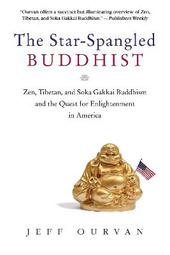
|
The Star Spangled Buddhist: Zen, Tibetan, and Soka Gakkai Buddhism and the Quest for Enlightenment in America
Paperback / softback
Main Details
| Title |
The Star Spangled Buddhist: Zen, Tibetan, and Soka Gakkai Buddhism and the Quest for Enlightenment in America
|
| Authors and Contributors |
By (author) Jeffrey Ourvan
|
| Physical Properties |
| Format:Paperback / softback | | Pages:208 | | Dimensions(mm): Height 229,Width 152 |
|
| Category/Genre | Buddhism |
|---|
| ISBN/Barcode |
9781634502894
|
| Classifications | Dewey:294.30973 |
|---|
| Audience | |
|---|
| Illustrations |
B&W photos
|
|
Publishing Details |
| Publisher |
Skyhorse Publishing
|
| Imprint |
Skyhorse Publishing
|
| Publication Date |
11 February 2016 |
| Publication Country |
United States
|
Description
"Ourvan offers a succinct but illuminating overview of Zen, Tibetan, and Soka Gakkai Buddhism."-Publishers Weekly Approximately four million Americans claim to be Buddhist. Moreover, hundreds of thousands of Americans of various faiths read about Buddhism, are interested in its philosophical tenets, or fashionably view themselves as Buddhists. They're part of what's been described as the fastest-growing religious movement in America: a large group of people dissatisfied with traditional religious offerings and thirsty for an approach to spirituality grounded in logic and consistent with scientific knowledge. The Star-Spangled Buddhist is a provocative look at these American Buddhists through their three largest movements in the United States: the Soka Gakkai International, Tibetan/Vajrayana Buddhism, and Zen Buddhism. The practice of each of these American schools, unlike most traditional Asian Buddhist sects, is grounded in the notion that all people are capable of attaining enlightenment in "this lifetime." But the differences are also profound: the spectrum of philosophical expression among these American Buddhist schools is as varied as that observed between Reformed, Orthodox, and Hasidic Judaism. The Star-Spangled Buddhist isn't written from the perspective of a monk or academic but rather from the view of author Jeff Ourvan, a lifelong-practicing lay Buddhist. As Ourvan explores the American Buddhist movement through its most popular schools, he arrives at a clearer understanding for himself and the reader about what it means to be-and how one might choose to be-a Buddhist in America.
Author Biography
Jeff Ourvan is a lifelong Buddhist, an attorney, and a literary agent. He is also the author of How to Coach Youth Baseball So Every Kid Wins. Prior to working as a literary agent, Jeff was a magazine editor, as well as a corporate lawyer, public relations consultant, geologist, and commercial fisherman. He resides with his wife, the novelist Jessica Jiji, and their three sons in Manhattan.
Reviews"Ourvan offers a succinct but illuminating overview of Zen, Tibetan, and Soka Gakkai Buddhism. . . . This highly informative book is especially suited to the reader who lacks a background in Buddhism, though it is also a satisfying refresher course for anyone with prior knowledge." Publishers Weekly "Attorney and literary agent Ourvan has written an endearing field guide to the major sects of Buddhism in this country: Zen, Tibetan, and Soka Gakkai International, in which he himself was a senior leader for a time. At once a slice of memoir and an informal but well-researched history of Buddhism's remarkable and growing success in the United States, Ourvan's brief account touches upon personalities, events, and doctrines. VERDICT: An accessible history of modern Buddhism in America, Ourvan's book fills a crucial gap, and deserves to attract many academic and nonacademic readers." Library Journal "Ourvan offers a succinct but illuminating overview of Zen, Tibetan, and Soka Gakkai Buddhism. . . . This highly informative book is especially suited to the reader who lacks a background in Buddhism, though it is also a satisfying refresher course for anyone with prior knowledge." Publishers Weekly "Attorney and literary agent Ourvan has written an endearing field guide to the major sects of Buddhism in this country: Zen, Tibetan, and Soka Gakkai International, in which he himself was a senior leader for a time. At once a slice of memoir and an informal but well-researched history of Buddhism's remarkable and growing success in the United States, Ourvan's brief account touches upon personalities, events, and doctrines. VERDICT: An accessible history of modern Buddhism in America, Ourvan's book fills a crucial gap, and deserves to attract many academic and nonacademic readers." Library Journal
|